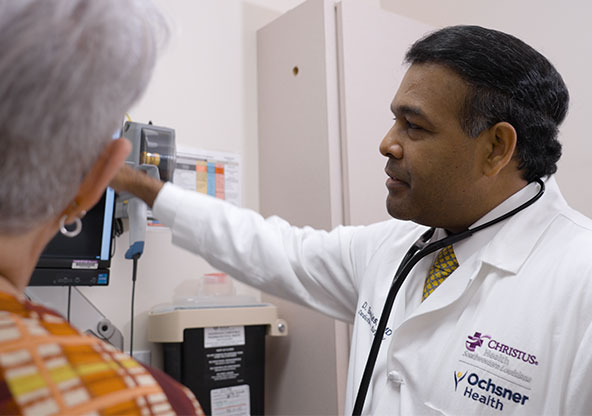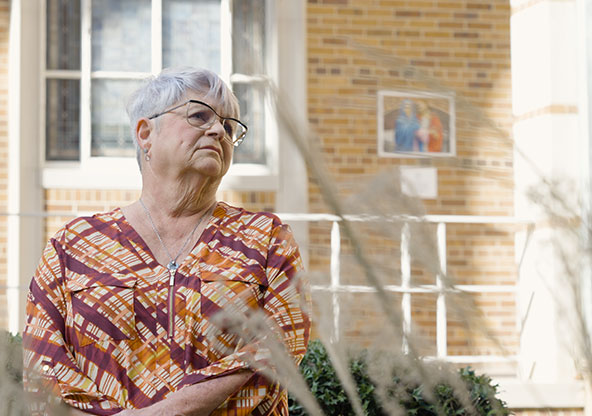From Diagnosis to Remission: The Power of Early Detection and Compassionate Care
When Sharron Thompson first noticed shortness of breath, she didn’t think it could be a sign of something serious. Thanks to her husband’s quick action and the expertise of the CHRISTUS Health team, a routine scan revealed a spot on her lung that would change her life.
From early detection to a fast, minimally invasive surgery and a quick recovery, Sharron’s story highlights the power of catching cancer early and the life-changing impact of expert, compassionate care.
Early Signs and Seeking Help
It Started with Shortness of Breath
Sharron’s journey began with something seemingly minor: “My husband noticed me being very short of breath.” Concerned, he encouraged her to visit their doctor, a decision that would prove life-saving.
Early symptoms like shortness of breath may seem small, but they can be the first sign of a bigger issue. Listening to your body—and acting quickly—can make all the difference.

Diagnosis and Discovery
A Routine Scan Revealed the Unexpected
After Sharron’s doctor listened to her symptoms, they recommended a routine heart scan. “They found a spot on my lung during the scan. It just went from there,” Sharron said.
That small, unexpected discovery triggered a series of tests to confirm the diagnosis and determine the next steps. The quick identification of the lung nodule was a critical turning point, emphasizing the importance of early screenings and proactive care.
Multidisciplinary Cancer Board
A Team of Experts Working Together to Build the Right Plan
When Sharron’s diagnosis was confirmed, her case was presented to the CHRISTUS Health Multidisciplinary Tumor Board—a team of specialists who collaborate to determine the best course of action for each patient. This team includes surgeons, oncologists, radiologists, pulmonologists, and other experts who review every detail of a patient’s case, ensuring no step is missed.
"We go over the films, radiographs, and studies—everything presented at the tumor board. This process allows us to address all options for the patient and create a tailored plan," explained Dr. Daniel Beckles, Surgical Director of Cardiothoracic Surgery at CHRISTUS Health.
For Sharron, the tumor board quickly identified that surgery was the best approach for her condition.
A Personal Approach
Sharron’s next step was meeting Dr. Beckles and his team for her first surgical consultation.
“We sit down with the entire family and start by breaking the ice,” Dr. Beckles said. “We ask what questions they’ve had since the diagnosis, and we go over every detail—addressing concerns and explaining the next steps.”
The team walked Sharron through her scans, test results, and surgical approach. Dr. Beckles said he would perform the procedure using minimally invasive surgery.
By the end of her consultation, Sharron and her family clearly understood what to expect, leaving them mentally and physically prepared for the journey ahead.
Minimally Invasive Surgery
Advanced Techniques for Faster Recovery
Sharron’s treatment plan included a minimally invasive procedure, a modern approach to surgery that reduces pain, scarring, and recovery time.
“99% of my cases are performed using minimally invasive or robotic surgery,” Dr. Beckles said. “This approach allows us to be precise while helping patients recover much faster.”
During minimally invasive surgery, doctors use specialized tools and advanced technology—like robotic-assisted systems—to operate through small incisions.
Pre-Surgery Preparation and Decision to Operate
When Sharron was diagnosed with stage 1 non-small cell lung cancer, the CHRISTUS Health team determined that the cancer had been caught early enough to treat with surgical resection alone—no chemotherapy or radiation was needed. This news was a great relief to Sharron and her family.
Evaluating Risk and Surgical Safety
Before proceeding with surgery, Dr. Beckles and his team thoroughly reviewed Sharron’s Lifestyle and medical history. They used a national risk calculator to determine her overall surgical risk.
The national risk calculator provides a detailed assessment, factoring Sharron’s age, health conditions, and other medical details. This allowed the team to estimate the likelihood of complications accurately. With a less than 1% risk of complications, Sharron was determined to be an excellent candidate for a minimally invasive procedure.
The Importance of Early Detection
Sharron’s story underscores the life-saving impact of catching cancer in its earliest stages. When lung cancer is diagnosed early—like in Sharron’s case—it allows for:
- More treatment options, including less invasive procedures
- A significantly higher chance of survival
- The possibility of avoiding chemotherapy or radiation
“More and more, 6% of incidental findings—like Sharron’s—turn out to be lung cancer,” Dr. Beckles explained.
According to the American Lung Association, early detection significantly improves survival rates. Only 27.4% of lung cancer cases are diagnosed at an early stage, when the five-year survival rate is 64%. Unfortunately, 43% of cases are not caught until a late stage, when the survival rate drops to just 8%.
Routine scans and acting on early symptoms can mean the difference between life-changing surgery and more intensive treatments. Sharron’s early diagnosis gave her the best possible chance for remission and a full recovery.
Surgery and Immediate Recovery
A Smooth Surgery and a Remarkable First Day of Recovery
On the morning of surgery, Sharron arrived at CHRISTUS Health feeling prepared and supported by her care team. The team ensured every detail was in place from the moment she checked in.
“Everyone is expecting them. The team—anesthesia, O.R. staff, and myself—ensures patients feel comfortable and supported before we begin,” Dr. Beckles said.
Sharron underwent a minimally invasive lung resection, where Dr. Beckles and his team used small incisions and robotic-assisted tools to remove the tumor with precision.
By that evening, Sharron’s progress was extraordinary.
“I was sitting up in a chair and talking to my husband,” Sharron said.
Her rapid recovery was a testament to the benefits of minimally invasive techniques, which reduce pain, scarring, and recovery time compared to traditional surgery. The advanced surgical techniques used at CHRISTUS Health help patients like Sharron recover faster, with fewer complications, so they can get back to life sooner.
Life After Surgery
Walking the Halls and Looking Ahead
The morning after surgery, Sharron was already up and walking the halls with encouragement from her care team.
"The nurse gave me a choice: we could do the short walk or the long walk. I said, let’s take the long walk," Sharron said.
Her determination, combined with the benefits of minimally invasive surgery, allowed Sharron to recover quickly. By the next morning, she was on her feet, and just two days after surgery, she was ready to go home.
A New Appreciation for Life
Now cancer-free, Sharron spends her days enjoying life’s simple pleasures—shopping, sitting on her porch, and savoring time with her family.
"I appreciate life more. I’m 72, but I still have years to go. I don’t take things for granted anymore," said.




